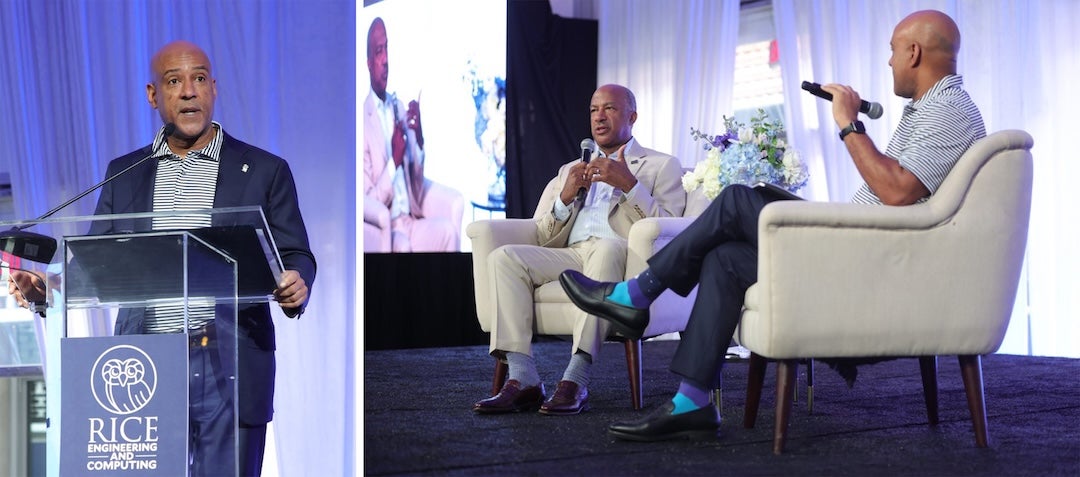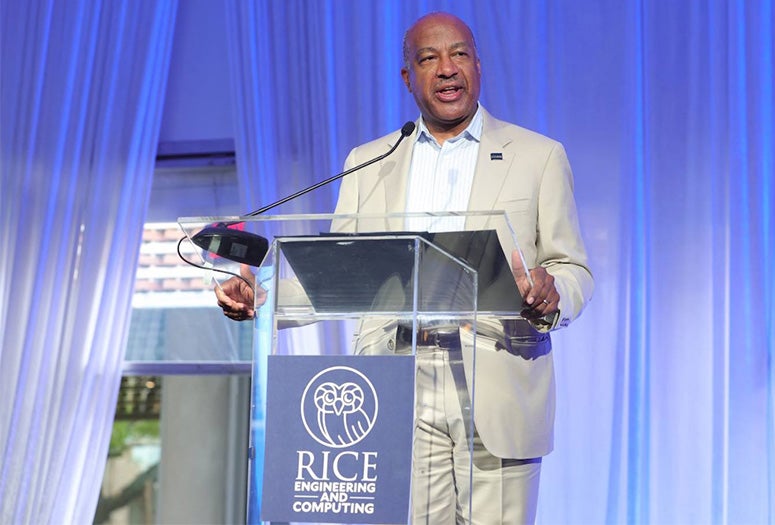
Rice University’s George R. Brown School of Engineering and Computing celebrated its 50-year anniversary with a recent two-day event that included panels, lab tours and a keynote address from Gary S. May, chancellor of the University of California, Davis.
Speaking on the second day of the celebration March 29, May delivered an inspiring talk on the future of engineering, highlighting the importance of inclusion, mentorship and imagination in shaping the next generation of innovators.
Rice President Reginald DesRoches introduced May as a longtime friend and mentor. The two met as students at University of California, Berkeley and have since walked parallel paths in academic leadership.
“Over the years, I have admired his dedication to advancing STEM education, fostering diversity in engineering and leading with vision and purpose,” DesRoches said.
With warmth and humor, May took the stage to deliver a keynote titled, “The Future of Engineering in Academia and the World,” blending personal narrative, national context and a powerful call to action.
“An engineering education must inspire students to harness their superpowers to create a better tomorrow,” May said. “As engineers, we solve problems. We like to create new things. We like to imagine what’s possible.”
A defining theme of May’s keynote was inclusion ⎯ not as a moral imperative alone but as a driver of better engineering.
“I will argue you can broaden participation and increase diversity without sacrificing quality,” he said.
May supported that argument with clear, urgent examples of what happens when diverse viewpoints and needs are left out of the design process: Airbags that were initially tested only on male-sized crash test dummies “almost killed women passengers,” he pointed out.

Early speech recognition systems failed to recognize female voices. Facial recognition technologies today continue to misidentify women and people with darker skin tones at far higher rates.
“I contend that if more representative groups of engineers were on those design teams or products that I mentioned, they may not have overlooked those particular design flaws,” May said. “Real advancements in technology are made when researchers with a broad mix of skills, backgrounds, experiences and ideas all have a seat at the table.”
May, a self-described comic book collector with over 14,000 issues in his collection, argued that imagination and inspiration are as crucial as aptitude in “creating the next generation of extraordinary discoveries.” He joked that Iron Man was an inspiration for many engineers, who were compelled to pursue the career path out of a desire to build the superhero’s suit.
Throughout his remarks, May emphasized the importance of mentorship and representation.
He shared how the mentorship of Augustine Esogbue, the first black faculty member to be promoted to full professor at the Georgia Institute of Technology, shaped his career and outlook.
May also called for experiential learning as a central tenet of an engineering education. Drawing a parallel to baseball, he explained that the experience of learning engineering without applied, hands-on engagement is like learning “how to throw, how to run, how to hit” but never actually playing the game.
“When I was an undergraduate, we learned a lot about how to do things but not why we were doing things,” he said.
To close that gap, May argued that engineering programs need to integrate experiential learning opportunities into undergraduate education, whether through research, design clinics and entrepreneurship; he also stressed the importance of setting in place an ecosystem and infrastructure to support and encourage innovation and multidisciplinary collaboration.
Following the keynote, DesRoches joined May for a candid and wide-ranging discussion about the future of engineering. Topics included the role of artificial intelligence (AI), the promise and limitations of online education, how universities can better partner with industry and more.

On computing and AI, May cautioned that “we need to be careful ⎯ just as I talked about some of the shortcomings of technology, AI has that same risk of being not sufficiently broad, not sufficiently accessible.” He stressed the importance of designing AI tools that are equitable and useful across all populations.
On online education, May drew a firm line: “I’m not sure you can get the same level of experience completely online as you would being in a residential program.”
While he praised online master’s programs, he argued that undergraduate students especially benefit from the social and developmental experiences of being on campus.
Finally, DesRoches asked, “What gives you hope?”
For May, the answer was simple and powerful: the students.
In closing remarks, Luay Nakhleh, the William and Stephanie Sick Dean of Engineering and Computing, noted that one of the central concepts of May’s keynote, “inclusive excellence,” is “a hallmark of what we do here at Rice, [and] also experiential learning, entrepreneurship as well as interdisciplinarity.”
“It’s in our DNA here at Rice,” Nakhleh said.

